 W
WA god game is an artificial life game that casts the player in the position of controlling the game on a large scale, as an entity with divine and supernatural powers, as a great leader, or with no specified character, and places them in charge of a game setting containing autonomous characters to guard and influence.
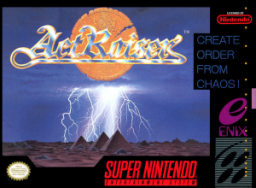 W
WActRaiser is a 1990 platform and city-building simulation game for the Super Nintendo Entertainment System developed by Quintet and published by Enix, combining traditional side-scrolling platforming with urban planning god game sections. A sequel, ActRaiser 2, was released for the Super NES in 1993. In 2007, ActRaiser became available on the Wii's Virtual Console download service in Europe, North America, and Japan. A version of the game was also released for European mobile phones in 2004.
 W
WAfterlife is a god game released by LucasArts in July 1996 that places the player in the role of a semi-omnipotent being known as a Demiurge, with the job of creating a functional Heaven and Hell to reward or punish the citizens of the local planet. The player does not assign citizens to their various punishments and rewards since the game does this automatically. Instead, the player creates the infrastructure that allows the afterlife to function properly. Players are accountable for the job that they do because of their bosses, The Powers That Be, check in from time to time. The player also has the assistance of two advisors—Aria Goodhalo, an angel, and Jasper Wormsworth, a demon. Aria and Jasper provide warnings when things are going wrong with the afterlife, and offer tips on how to fix the problems.
 W
WBaldies is a real-time strategy video game developed by Creative Edge Software and originally published by Atari Corporation for the Atari Jaguar CD in North America and Europe on December 1995. In the game, players build and manage a community of the titular short and plump bald characters with the ultimate goal of conquering the world by defeating similarly-looking short little hairy people known as the "Hairies". Its gameplay mainly consists of strategy taking place during real-time, combining both simulation and god game elements as well, while online multiplayer with up to four players using a modem or over a local area network is only supported on PC.
 W
WBlack & White 2 is a video game developed by Lionhead Studios and published by Electronic Arts released in October 2005. It is the sequel to 2001's Black & White. A Mac OS X port was released in January 2009, and released for download via the Mac App Store in November 2014. The game blends real-time strategy and god game elements.
 W
WCreatures 2 is the second game in the Creatures artificial life game series made by Creature Labs, and the sequel to 1996 game Creatures. It features three species: the cute, dependent Norns, the cantankerous Grendels and the industrious Ettins. The game tries to simulate life, and includes a complex two-dimensional ecology of plants, animals and insects, which provide the environment for the three main species to live and develop in. The player interacts with the world using a hand-shaped cursor, and tries to encourage the creatures' development by manipulating various objects around the world, guiding the creatures using the cursor and encouraging the creatures to speak.
 W
WCreatures 3 is the third game in the Creatures a-life game series made by Creature Labs. In this installment, the Shee have left Albia in a spaceship, the Shee Ark, to search for a more spherical world. The Ark was abandoned by the Shee because a meteor hit the ship, but the infrastructure still remains in working order.
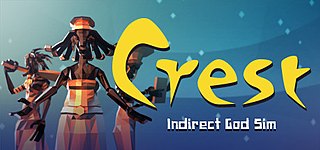 W
WCrest is a god-game strategy video game in development by Eat Create Sleep, for Microsoft Windows, OS X, and Linux. The game was released into Steam Early Access on 23 April 2015. and launched on 8 March 2018.
 W
WDino Island is a 2002 PC business simulation video game developed and published by Monte Cristo.
 W
WDoshin the Giant is a Nintendo god simulation game for the Nintendo 64 and GameCube. It was originally released in Japan on December 1, 1999, as a launch game disk for the 64DD peripheral for Nintendo 64. A soundtrack by Tatsuhiko Asano was released on CD by Media Factory, early the next year. Both of these received positive reviews. An expansion was released five months later called Kyojin no Doshin Kaihō Sensen Chibikko Chikko Daishūgou, which takes a very different perspective of the game, featuring short animated clips that the player can unlock after playing the original game. Doshin the Giant was upgraded graphically released for the GameCube in Japan on March 14, 2002, and Europe on September 20, 2002. The re-release received extremely positive reviews.
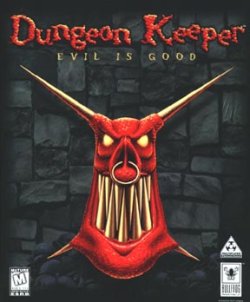 W
WDungeon Keeper is a strategy video game developed by Bullfrog Productions and released by Electronic Arts in June 1997 for MS-DOS and Windows 95. In Dungeon Keeper, the player builds and manages a dungeon, protecting it from invading 'hero' characters intent on stealing accumulated treasures, killing monsters and ultimately the player's demise. The ultimate goal is to conquer the world by destroying the heroic forces and rival dungeon keepers in each realm. A character known as the Avatar appears as the final hero. Dungeon Keeper uses Creative Technology's SoundFont technology to enhance its atmosphere. Multiplayer with up to four players is supported using a modem, or over a local network.
 W
WDungeon Keeper 2 is a strategy game developed by Bullfrog Productions and published by Electronic Arts in 1999 for Microsoft Windows. The sequel to Dungeon Keeper, the player takes the role of a 'dungeon keeper', building and defending an underground dungeon from the would-be heroes that invade it, as well as from other keepers. In the campaign mode, the player is charged with recovering the portal gems from each area in order to open a portal to the surface. The player can also construct a dungeon without strict objectives, and multiplayer is supported over a network.
 W
WEverything is a simulation game developed by artist David OReilly. It was released for the PlayStation 4 on March 21, 2017, for Microsoft Windows and macOS on April 21, 2017, and for Linux on April 28, 2017. A Nintendo Switch version of the game was released on January 10, 2019. It was released in Japan on February 13, 2020. The game sees the player take control of various lifeforms and inanimate objects, exploring the procedurally generated world and finding new things to take control of. Everything features quotations from philosopher Alan Watts and has no clear goal aside from occupying more objects within the game. It received critical acclaim and was qualified for the Oscars.
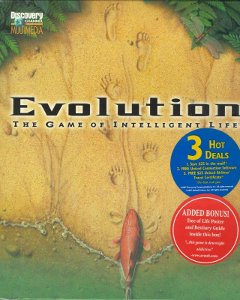 W
WEvolution: The Game of Intelligent Life, also known as Genetic Evolution: The Race for Intelligent Life in Germany and Evolução: O Jogo da Vida in Brazil, is a life simulation and real-time strategy computer game that allows players to experience, guide, and control evolution from an isometric view on either historical earth or on randomly generated worlds while racing against computer opponents to reach the top of the evolution chain, and gradually evolving the player's animals to reach the "grand goal of intelligent life".
 W
WFrom Dust is a god video game, designed by Éric Chahi and developed by Ubisoft Montpellier. The game was released for Microsoft Windows, PlayStation Network, and Xbox Live Arcade in 2011. Described as a spiritual successor to Populous, the game revolves around The Breath, which was summoned by a tribe to help them seek and recover their lost knowledge. In the game, players, controlling a cursor, can manipulate matter such as lava, soil, and water. Players can help the tribespeople to overcome challenges including finding different totems and overcoming natural disasters. In addition to the story mode, the game features a Challenge mode which offers a shorter, but harder experience.
 W
WGodFinger was a game developed by Wonderland Software and published by ngmoco for the iOS platform, which reached #1 on the US App Store. It is no longer available for download on the iPhone, iPod touch and the iPad on the App Store or iTunes. Although a free app, customers are able to buy in-app purchases.
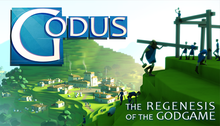 W
WGodus is a video game in the god game genre, developed by the independent company 22Cans and published by DeNA. The company launched a Kickstarter campaign to raise funds and met their funding goal of GB£450,000 on 20 December 2012. Godus was designed by Peter Molyneux, who described it as the spiritual successor to his earlier creation, Populous. While the mobile versions of the game continue to be updated, the early access Steam release has yet to see an updated beta since 2016. The contract of the lead developer of the game, Konrad Naszynski, expired 28 June 2016, and it has been reported that there is no one left working on the PC version.
 W
WGodville is a mobile and desktop browser zero-player role-playing video game developed by Mikhail Platov and released on July 18, 2010. In the game, the player controls a character known as the god, who interacts with a character called the hero. The hero progresses in the video game without interaction with the player's god character. Reception to the game was positive, with the focus on its gameplay.
 W
WHeaven and Hell is a turn-based strategy video game developed by German studio MadCat Interactive and published by CDV Software in 2003.
 W
WLego Loco is a Lego-branded virtual world game for Microsoft Windows, released in November 1998. It is a simple open-ended construction game with an emphasis on Rail Transport. The aim of the game is to construct a town in which Lego people can live. This was the first game released by Lego Media, the publishing division of The Lego Group that was founded after the commercial success of Mindscape's Lego Island.
 W
WLittle Computer People, also called House-on-a-Disk, is a life simulation game released in 1985 by Activision for the Commodore 64, Sinclair ZX Spectrum, Amstrad CPC, Atari ST and Apple II. An Amiga version was released in 1987. Two Japanese versions were also released in 1987, a Family Computer Disk System version, published in Japan by DOG, and a PC-8801 version.
 W
WMega-Lo-Mania is a real-time strategy computer game developed by Sensible Software. It was released for the Amiga in 1991, and ported for a variety of other platforms. It was released as Tyrants: Fight Through Time in North America and Mega-Lo-Mania: Jikū Daisenryaku (メガロマニア時空大戦略) in Japan.
 W
WOrgarhythm is a video game developed by Acquire and Neilo and published by Xseed Games for the PlayStation Vita. It is a hybrid between god simulation, rhythm and strategy. The game would also be available on Nvidia Tegra 3 tablet devices.
 W
WPaper Beast is a 2020 virtual reality adventure game developed and published by Pixel Reef for PlayStation 4 and Microsoft Windows. The game was created by Éric Chahi, who previously worked on Another World. In the game, players are tasked to navigate a world inhabited by various digital lifeforms. It received generally positive reviews upon release. Paper Beast: Folded Edition, a non-VR version of the game, is set to be released in October 20, 2020.
 W
WPatapon (パタポン) is a video game published originally for the PlayStation Portable handheld game console combining gameplay features of a rhythm game and a strategy video game. The title is created from two Japanese onomatopoeia, pata (marching) and pon (drumming). The game is presented in a cartoonish, silhouetted two-dimensional environment, and features the player acting as a deity who commands an army of caricatured miniature tribal creatures by beating traditional talking drums. The game was developed by Pyramid and produced by Japan Studios.
 W
WPatapon is a 2007 video game co-developed by Pyramid and SCE Japan Studio for the PlayStation Portable. It combines elements of rhythm and strategy. In the game, the player acts as an invisible deity to a tribe of anthropomorphic eye-balls known as "Patapons" that can be commanded to move forward, attack, defend and retreat by using a sequence of drum beats. The story follows the journey of the Patapon tribe in their journey to reach Earthend and gaze upon "IT". Throughout their adventure, they encounter giant beasts and an enemy tribe known as the Zigotons that serve as obstacles.
 W
WPatapon 2 is a video game by Sony Computer Entertainment published for the PlayStation Portable handheld game console. It combines gameplay features of a rhythm game and a god game. The title is created from two Japanese onomatopoeia, pata (marching) and pon (drumming). The game is presented in a cartoonish, silhouetted two-dimensional environment, and features the player acting as a deity who commands an army of caricatured miniature tribal creatures by beating traditional talking drums. The game was developed by Pyramid and produced by Japan Studios. It is a direct sequel to Patapon .
 W
WPatapon 3 is a rhythm game for the PlayStation Portable and sequel to Patapon 2. It was developed by Pyramid and SCE Japan Studio and published by Sony Computer Entertainment. Gameplay is similar to previous titles, but has a greater focus on multiplayer than Patapon 2. Like its predecessors, Patapon 3 is presented in a cartoonish, silhouetted two-dimensional environment designed by Rolito, now with more detailed backgrounds.
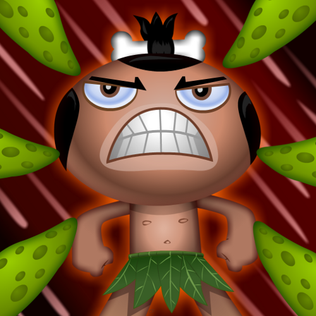 W
WPocket God is a game developed by Bolt Creative, in which the player manipulates an island and its inhabitants. It was released for the iPad, iPhone, and iPod Touch on January 9, 2009, and released for Verizon Wireless on September 1, 2010, Android on December 1, 2010, and Windows Phone on December 4, 2010. The Facebook version was released December 23, 2010.
 W
WPopulous is a video game developed by Bullfrog Productions and published by Electronic Arts, released originally for the Amiga in 1989, and is regarded by many as the first God game. With over four million copies sold, Populous is one of the best-selling PC games of all time.
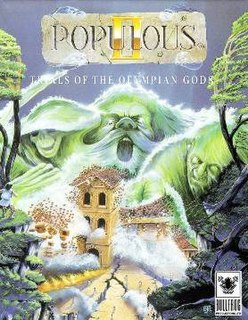 W
WPopulous II: Trials of the Olympian Gods is a 1991 strategy video game in the Populous series for the Amiga, Atari ST and MS-DOS-based computers, developed by Bullfrog Productions. Populous II is a direct sequel to Bullfrog's earlier game Populous and is one of the company's most notable games.
 W
WPopulous: The Beginning is a real-time strategy video game and is the third entry in the Populous video game series, developed by Bullfrog Productions. The game was released in 1998 on Microsoft Windows, and in 1999 for the PlayStation. Unlike earlier games in the series, which cast the player in the role of a god influencing loyal followers, The Beginning took a radical departure and placed the player in the role of a shaman, who directly leads her tribe against opponents. Throughout the twenty-five missions of the campaign, the player leads their tribe across a solar system, dominating enemy tribes and tapping new sources of magic, with the ultimate goal of the shaman attaining godhood herself.
 W
WReus is an indie game produced by independent game studio Abbey Games. Reus is a god game in which the player controls giants who can modify the nature of the planet through terraforming, creating life, and altering genes. The game was released for Microsoft Windows on May 16, 2013.
 W
WRise to Ruins is a city-building strategy video game developed by Raymond Doerr and published by his independent company, SixtyGig Games, for Microsoft Windows, OS X, and Linux. The game was released into Steam Early Access on 27 October 2014.
 W
WSeaman 2: Pekin Genjin Ikusei Kit is a virtual pet video game for the PlayStation 2. It is the sequel to Seaman on the Dreamcast. In this game, players act as god of a miniature island, charged with the task of rearing Gabo, a 20-centimeter tall Peking Man, communicating through a custom microphone-equipped gamepad.
 W
WSimCity, also known as Micropolis or SimCity Classic, is a city-building simulation video game developed by Will Wright and released for a number of platforms from 1989 to 1991. SimCity features two-dimensional graphics and an overhead perspective. The objective of the game is to create a city, develop residential and industrial areas, build infrastructure and collect taxes for further development of the city. Importance is put on increasing the standard of living of the population, maintaining a balance between the different sectors, and monitoring the region's environmental situation to prevent the settlement from declining and going bankrupt.
 W
WSimEarth is a life simulation video game, the second designed by Will Wright, in which the player controls the development of a planet. The game was published in 1990 by Maxis. Versions were made for the Apple Macintosh, Commodore Amiga, IBM PC, SNES, Sega Mega-CD and TurboGrafx-16. It was also subsequently re-released on the Wii Virtual Console. In 1996 several of Maxis' simulation games were re-released under the Maxis Collector Series with greater compatibility with Windows 95 and differing box art, including the addition of Classics beneath the title. SimEarth was re-released in 1997 under the Classics label.
 W
WSimLife: The Genetic Playground is a video game produced by Maxis in 1992. The concept of the game is to simulate an ecosystem; players may modify the genetics of the plants and animals that inhabit the virtual world. The point of this game is to experiment and create a self-sustaining ecosystem. SimLife was re-released in 1993 as part of the SimClassics Volume 1 compilation alongside SimCity Classic and SimAnt for PC, Mac and Amiga.
 W
WThe Sims FreePlay is a strategic life simulation game developed by EA Mobile and later with Firemonkeys Studios. It is a free version of The Sims for mobile devices; it was released for iOS on December 15, 2011, released for Android on February 15, 2012, released for BlackBerry 10 on July 31, 2013, and released for Windows Phone 8 on September 12, 2013. The game was released for Fire OS in October 2012.
 W
WThe Sims Mobile is a life simulation game based on The Sims 4 and The Sims FreePlay for Android and iOS devices. It was announced on May 9, 2017 in a launch trailer. The game was released on March 6, 2018. It features a multiplayer component and includes story elements. Development has been transferred from Maxis to Firemonkeys Studios.
 W
WThe Sims is a series of life simulation video games developed by Maxis and published by Electronic Arts. The franchise has sold nearly 200 million copies worldwide, and it is one of the best-selling video game series of all time.
 W
WSkull Caps, the RTS video game sequel to Baldies, was developed by Creative Edge Software and published by Ubi Soft in 1998. Available localizations include English, French, German, Italian, Spanish versions.
 W
WSpore is a 2008 life simulation real-time strategy God game developed by Maxis, published by Electronic Arts and designed by Will Wright, and was released for Microsoft Windows and Mac OS X. Covering many genres including action, real-time strategy, and role-playing games, Spore allows a player to control the development of a species from its beginnings as a microscopic organism, through development as an intelligent and social creature, to interstellar exploration as a spacefaring culture. It has drawn wide attention for its massive scope, and its use of open-ended gameplay and procedural generation. Throughout each stage, players are able to use various creators to produce content for their games. These are then automatically uploaded to the online Sporepedia and are accessible by other players for download.
 W
WSpore Creatures is a spin-off of Spore, developed by Griptonite Games and published by Electronic Arts, in which a player controls and evolves a creature of their creation. It is a science fiction adventure game.
 W
WUtopia is a 1981 strategy video game by Don Daglow released for the Intellivision and Mattel Aquarius. It is often regarded as among the first city building games, and credited as "arguably the earliest ancestor of the real-time strategy genre." In July 2010, the game was re-released on Microsoft's Game Room service for its Xbox 360 console and for Games for Windows Live.
 W
WWar for the Overworld is a real-time strategy video game developed by Subterranean Games, which changed its name to Brightrock Games based in Brighton, UK. The game started as a crowdfunding campaign on Kickstarter, which ran from November 29, 2012, to January 3, 2013. In the game, players build dungeons containing deadly traps to kill adventuring heroes that enter. The game is inspired by Dungeon Keeper, StarCraft, Overlord, and Evil Genius. It includes a campaign, sandbox mode, and online multiplayer.